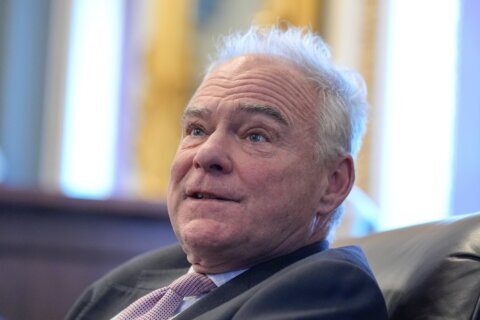Republican and Democratic leaders from the House and Senate will meet again Wednesday and try to find a way out of a spending crisis that could cripple Washington in the fall, trigger $125 billion in automatic spending cuts and send the stock market tumbling.
When House Speaker Nancy Pelosi, Senate Majority Leader Mitch McConnell, Senate Minority Leader Chuck Schumer, House Minority Leader Kevin McCarthy, White House officials and appropriators meet Wednesday afternoon, there will be fewer than 50 legislative days before the spending deadline.
In Washington, three months may be akin to an eternity for negotiations, but fresh off a partial but history-making January government shutdown, with animosity between House Democrats and the administration in clear view, and President Donald Trump looming as the constant legislative wild card, the meeting signals an attempt to stave off an avoidable showdown and debt ceiling debacle that would leave both Republicans and Democrats politically damaged and the country reeling from their showdown.
“I don’t know if there is any goodwill, but there is mutual self-interest so I hope they can find it,” Sen. Roy Blunt, a Republican from Missouri and member of leadership, told CNN about the odds for an agreement.
The meeting Wednesday will focus on raising the budget caps for both domestic and military spending. Without an agreement, automatic budget cuts from 2011 would go into effect, a result that both Republicans and Democrats agree could devastate government programs and paralyze the military. Ahead of the meeting, Sen. Dick Shelby, the Alabama Republican and chairman of the Senate Appropriations Committee, said he called Pelosi on Saturday arguing it was time to “get together”
“We’re meeting tomorrow, and let’s see what comes out of it,” Shelby said. “I hope good news.”
But, behind the scenes, there is a growing concern about whether the President understands the full cost of inaction. The President’s acting chief of staff Mick Mulvaney is largely seen on Capitol Hill as an outgrowth of the House Freedom Caucus — the rabble rousing, group for which he once belonged. Now, Mulvaney — once a cheerleader for budget slashing across the federal government — has the President’s ear, a fact that hasn’t been lost on Republican senators anxious the President could reject an agreement they make with Democrats.
One Republican senator who requested to speak on the condition of anonymity to freely discuss the political dynamics of keeping Trump from following Mulvaney on spending negotiations said Treasury Secretary Steve “Mnuchin is trying to overcome that, but when the chief of staff is there all day every day in every meeting, it’s hard not to listen.”
The member remarked that he’d heard Mulvaney had tried to convince the President to allow the sequester to go into effect and then offset the automatic spending cuts by raising Overseas Contingency Operations funding, a ploy that Democrats would never go for.
In the meantime, Republicans and Democrats struck a $4.6 billion deal Tuesday night on a smaller border supplemental spending package to manage the crisis at the border. Part of that package includes $2.88 billion in funding to keep the Office of Refugee Resettlement operating. The ORR, the office that houses unaccompanied minors on the border, was slated to run out of money by the end of the month.
The Senate Appropriations Committee is holding a markup on the supplemental bill Wednesday.
Democrats and Republican had come very close to getting a deal on a supplemental border bill back in May as part of a broader deal on disaster aid funding, but last-minute disagreements about policy riders derailed them.
Shelby and the ranking Democratic member of the Appropriations Committee, Sen. Patrick Leahy of Vermont, spent the weekend abroad together where they continued to discuss the supplemental along with staff.







